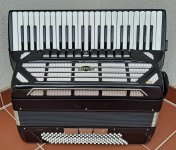Walker
🪗
I would like to ask the advice of the forum members about something of a cross-roads I have reached. I have played the traditional piano accordion, with stradella system and musette tuning, most of my life. But recently I added a converter free bass accordion to my musical journey and took the first few steps with it.
I chose the quint converter and it's been over seven months now, but I have enjoyed it and managed to get a couple of tunes out of the accordion too. So, overall I think it works fine.
But now I feel like I am at a cross-roads and before I commit to a set route for good, I thought I would just check the map and maybe ask for some directions from you all.
Seems to me there are 3 different directions from here...
Straight ahead: I keep working on the quint converter piano accordion, 41/120 (36 free bass, but extendible by 1 octave). Maybe in time upgrade to a cassotto instrument. The range is not huge but it's quite usable. It's not like a chromatic converter accordion with a total compass of E1 to C#8.
Turn Left: Take up a different type of converter accordion (whilst maintaining the piano accordion with stradella bass). I would look for a C system button accordion with corresponding chromatic free bass in this scenario - but it might also take years to learn.
Turn Right: Learn piano accordion with chromatic C system free bass. Familiarity on the treble, but the bass would be new. An extensive range of notes, but maybe 41 keys with say 55 free basses is slightly imbalanced. 47 keys and 55 free basses is not too bad.
I have no concerns about any of the systems for what I play (writing my own music and maybe learning the occasional keyboard tune). Each direction will have strengths and weaknesses. I would like to ask the thoughts and opinions of those on the forum. What would you suggest as the long term choice moving forward.
I chose the quint converter and it's been over seven months now, but I have enjoyed it and managed to get a couple of tunes out of the accordion too. So, overall I think it works fine.
But now I feel like I am at a cross-roads and before I commit to a set route for good, I thought I would just check the map and maybe ask for some directions from you all.
Seems to me there are 3 different directions from here...
Straight ahead: I keep working on the quint converter piano accordion, 41/120 (36 free bass, but extendible by 1 octave). Maybe in time upgrade to a cassotto instrument. The range is not huge but it's quite usable. It's not like a chromatic converter accordion with a total compass of E1 to C#8.
Turn Left: Take up a different type of converter accordion (whilst maintaining the piano accordion with stradella bass). I would look for a C system button accordion with corresponding chromatic free bass in this scenario - but it might also take years to learn.
Turn Right: Learn piano accordion with chromatic C system free bass. Familiarity on the treble, but the bass would be new. An extensive range of notes, but maybe 41 keys with say 55 free basses is slightly imbalanced. 47 keys and 55 free basses is not too bad.
I have no concerns about any of the systems for what I play (writing my own music and maybe learning the occasional keyboard tune). Each direction will have strengths and weaknesses. I would like to ask the thoughts and opinions of those on the forum. What would you suggest as the long term choice moving forward.
Last edited:

